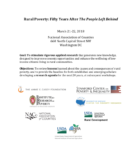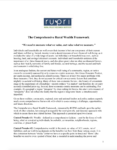RUPRI Panels Provide Comments on Census Bureau Proposed Urban Definition
The RUPRI Population and Place Analytics Panel and the RUPRI Health Panel jointly provided comments to the Census Bureau on the proposed definition of Urban
Home | Focus Areas | Population and Place
RUPRI provides rural public policy analysis and recommendations that are grounded in evidence. The RUPRI Population and Place Analytics Program uses internal and external components to strengthen the sound analytic capacity of RUPRI.
The Population and Place Analytics Panel focuses on sustainable wealth creation in rural America, moving beyond traditional measures of success in rural economies, such as GDP or personal income. The desire for a deeper understanding of quality of place and quality of life dynamics led to the development of the Comprehensive Rural Wealth Framework, which considers community and environmental factors in addition to traditional economic measures to create a more holistic view of wealth and well-being.
The challenges of poverty can be exacerbated by the lack of access to social services in rural areas. As such, poverty is an important element present in each of RUPRI’s focus areas, but takes special consideration by the Population and Place Analytics Panel.
The Rural Poverty Research Conference challenges scholars to generate new knowledge designed to improve economic opportunities and enhance the well-being of low-income citizens living in rural communities. The conference seeks to review lessons about the causes and consequences of rural poverty and to develop a wide-ranging, rigorous research agenda that will improve economic opportunity and well-being across rural and low-income communities.
The 2018 conference [link in library] was supported by RUPRI, the USDA, the National Association of Counties, the Annie E. Casey Foundation, Stanford University, the University of Kentucky, and the University of Wisconsin–Madison.
The goal of this project is to increase the prosperity of the rural poor and rural communities by identifying the impact of community-level assets on household-level livelihood strategies in the face poverty and economic uncertainty. An integrated, mixed-methods (MM) research approach will be used to address the study’s research objectives. National level analysis will be based on data from the Panel Study of Income Dynamics (PSID) to compare the livelihood strategies and outcomes of the rural poor in Indiana to the U.S. as a whole.
A comparative case study, including community surveys, interviews, and focus groups, of three rural Indiana communities will enable an improved understanding of how both community- and household-level characteristics influence the adoption and efficacy of various household-level livelihood strategies. These combined methods will allow us to assess how the use and combination of various livelihood strategies impacts the poverty status and material hardship of the rural poor, and draw important policy lessons regarding how the U.S. social safety net impacts the ability of the rural poor to respond to economic adversity.
This project is aligned with the AFRI goals to promote economically and socially sustainable, resilient rural communities. We believe that the well-being of rural communities and resilience of rural households requires a comprehensive understanding of the factors associated with both poverty and livelihood strategies. Additionally, efficacious and comprehensive poverty-reduction policy necessitates a better, more nuanced understanding of how rural households are already coping with poverty and what community assets are most effective at supporting them.
Rural communities in the United States are facing unprecedented challenges in the face of a historic economic downturn, global economic pressures, and an ongoing economic restructuring of the national economy. Small rural regions often feel helpless in the face of these macroeconomic forces; however, there is great interest in proactive action which will foster economic resilience against these external pressures.
This research intends to quantitatively measure the economic resilience of each county in the United States and then estimate what community specific factors relate to increased economic resilience. This research will employ a community capitals framework for measuring regional community wealth and isolate the marginal effects of each type of community capital on economic resilience. This research will also investigate the role of community wealth distribution, rather than just the total wealth endowment, on economic resilience. This funding will also be used to build the capacity of rural communities in Eastern Oregon and Idaho to think more strategically about economic development opportunities, to use data and market analysis in their decisions, and to track the efficacy of economic development investment decisions.
The RUPRI Population and Place Analytics Panel and the RUPRI Health Panel jointly provided comments to the Census Bureau on the proposed definition of Urban
RUPRI, led by the Rural Health Panel and the Population and Place Analytics Panel, has released comments on Recommendations from the Metropolitan and Micropolitan Statistical
RUPRI Scholar, Matt Fannin, from Louisiana State University, will participate in a National Academy of Sciences Gulf Research Board Advisory Panel on Community Resilience on

An Invited conference lifting up multidisciplinary social science research on rural poverty in the United States on the 50thAnniversary of the 1967 report of the

This paper outlines the importance of financial assets to individuals and households and discusses two major problems with economic-centric measures. It also concludes that community,
Browse the RUPRI library for more from the Population and Place Analytics Panel.
Browse the RUPRI library for more related to Wealth Creation and the Eight Capitals.
Rural Policy Research Institute
The University of Iowa
College of Public Health
319-384-3857 | info@rupri.org